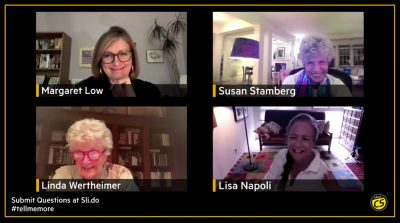Susan Stamberg, Linda Wertheimer, Nina Totenberg and the late Cokie Roberts all worked for NPR during its founding years amid the women’s movement of the 1970s, and all broke boundaries for women in media.

As NPR celebrates its 50th anniversary, “founding mothers” Stamberg and Wertheimer joined author Lisa Napoli to provide insight into their life stories Nov. 1 in the most recent installment of WBUR’s “Tell Me More!” series. The monthly series features conversations between leaders in a variety of fields, revealing their backstories and their journeys to where they are today.
Napoli is the author of “Susan, Linda, Nina & Cokie: The Extraordinary Story of the Founding Mothers of NPR,” a book released April 2021 detailing the careers of the women.
“From its beginnings, public radio did, in one arena, a slightly better job of addressing the needs of a constituency that, at the time, also was rarely given a voice: women,” Napoli’s Author’s Note reads at the beginning of her book. “This is the story of how that happened.”
At the event, Napoli said she enjoys learning more about the backstories of people who are now commonplace media giants. Before “Susan, Linda, Nina & Cokie,” she released “Up All Night: Ted Turner, CNN, and the Birth of 24-Hour News,” which focuses on the beginnings of CNN.
“Because CNN just turned 40, it seemed like looking at NPR turning 50 was the natural next step,” Napoli said at the event.
The event was held virtually, and Napoli described Zoom as “disorienting” because of the inability to see the audience.
“On the one hand, it was wonderful that it allowed us all to be together safely, but on the other hand, it’s an odd construct,” Napoli said in an interview.
Margaret Low, WBUR CEO and event moderator, recalled her early memories of Stamberg and Wertheimer at the event. Low began at NPR as an overnight production assistant in 1982, and she remembers Stamberg applying lipstick in the restroom before the show every night.
“I was either too new or too shy to say much more than hello when I first bumped into her there,” Low said. “She was already a legend.”
As she progressed in the newsroom, Low began to work more closely with Stamberg, Wertheimer, Totenberg and Roberts — what she calls an influential experience.
“It was a chance to learn from the very best,” Low said. “These four women may not have been the boss, but they were boss and stunning role models for a whole generation of women who followed them.”
Wertheimer was among those who entered the news industry during the women’s movement of the 1970s. Wertheimer said the experience “was such a wonderful thing to be a part of.”
“I felt very lucky that we had happened to arrive at a moment where things were going on, but you had to jump into it,” Wertheimer said at the event. “You had to grab it with both hands. You couldn’t let any tiny part of that moment get past you. And it was a little scary, it was a lot scary. But I loved it.”
Wertheimer said she was inspired by Pauline Frederick, the first woman to work for a television network. Then, through their perseverance and tenacity, Wertheimer and Stamberg themselves became role models for others.
“We reached our hands out to other women,” Stamberg said, “and we mentored them and we said, ‘Come on in, apply for a job.’”
In an interview, Napoli stressed the importance of understanding that women have not always had the opportunities that are available to them now.
“I feel like everything I do everyday is to honor what my mother, who wasn’t able to go to college as a young person, has done to make it possible for me to have a better life and a better education,” Napoli said.
At the event, the women also discussed the importance of representation in terms of the current push for racial diversity in the news industry.
“I feel this is a tectonic change that we’re living through this minute,” Stamberg said. “It’s not ‘We shall overcome someday.’ It’s overcoming and it’s happening right now and it’s really paying off.”
While the event was entirely virtual, a Q&A function using the app Slido allowed the audience members to have some of their questions answered live. One audience member inquired how the women met, and Stamberg and Wertheimer reminisced about the office they shared in the early days of NPR and the supportive culture that was created.
“I’m not sure that men have the same experience that women do in a situation like this. We were not competitive. We were not trying to do each other in,” Wertheimer said. “If anybody needed help, there would be help.”
In terms of advice for those who are beginning careers in journalism, Stamberg — who described herself as a “schmoozer”— suggested that while it is important to be prepared, it is also important to follow instincts, be natural and have confidence when talking to people.
“Turn your internal editor off for a while,” Stamberg said, “And just be open to new possibilities.”
Wertheimer added that journalists should be curious and unafraid.
“Journalism wants people who will do that,” Wertheimer said, “who will step out in front of the crowd and ask the questions that need to be asked.”



























































































































